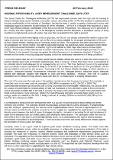February 2010 Basic Needs and Nutrition Basket: Housing Affordability, a Key Development Challenge, Says JCTR

View/
Date
2010-02-15Author
Jesuit Centre for Theological Reflection
Type
StatementLanguage
enItem Usage Stats
30
views
views
8
downloads
downloads
Abstract
The cost of housing over the past year in the medium density areas has however increased. For example, a
three bed room house now costs on average K1,500,000 in comparison to K1,100,000 in 2009. This unprecedented increase has led to the cost of living becoming very unaffordable. Additionally, the January BNB for Lusaka revealed that the nominal prices of food has increased by K20,300 from a total of K822,100 at the end of December to K842,400 at the end of January. Increases were recorded in mealie meal and protein rich foods such as beans, meat and eggs. Adding the cost of housing and other essential basic needs such as energy, water and sanitation, the cost of living as at end of January 2010 amounted to K2,696,030 up from K2,276,730 in December 2009.
Description
It is important to bring to the fore the fact that there is a causal link among diverse basic needs and these
reinforce one another. For example, decent housing plays a major role in curbing diseases. “Fundamentally”,
says Ms. Chibuye, “good housing and well-serviced neighbourhoods should not just be appreciated for its
intrinsic value but also for the positive impacts on human capital and capabilities for participation”. In most high
density areas however, the lack of proper drainages has led to a situation of recurring floods and incidences of
water borne diseases such as cholera, particularly during the rainy season. The urban poor suffer the most as
they tend to live in very poorly serviced high density areas. As a consequence, the cost of decent housing
exacerbates inequalities in accessing them. These excessive economic and social differences militate against
the principles of social justice and equity.